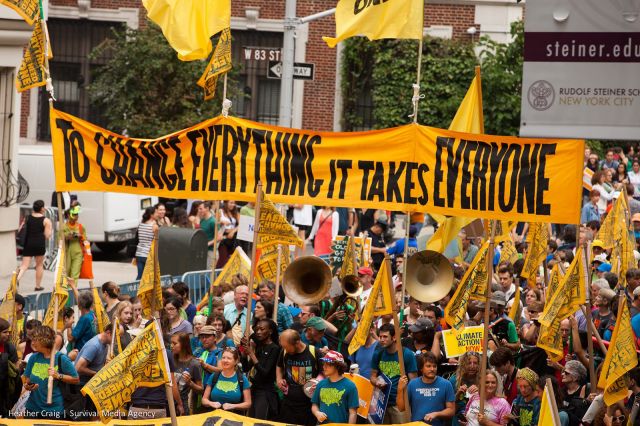
“To change everything, we need everyone.” That is the slogan of the People’s Climate March being held globally on the weekend of November 27-29.
The rallies will coincide with the upcoming UN climate talks in Paris and will demand a transition to a safe climate that ensures jobs and social justice. But the rallies are not just about appealing to politicians to make a strong agreement in Paris — there is very little chance of that happening.
More importantly, the rallies are a way to build a vibrant climate movement that unites all sections of society. This movement needs to be inclusive and democratic, one that can challenge the fossil fuel industry directly and demand governments take much stronger action.
In Australia, dozens of grassroots climate groups, trade unions, environmental organisations and others have already begun plans to hold rallies in Sydney, Melbourne, Brisbane, Adelaide and elsewhere.
Green Left Weekly is throwing its support behind these rallies and will help build them to be as large and broad as possible.
Naomi Klein, author of This Changes Everything: Capitalism vs the Climate, is backing this people’s movement. On her recent visit to Australia she said: “The conflict between what the planet needs and what capitalism needs is exemplified in Australia … The ideology of market fundamentalism simply cannot accommodate what humans need to do in the face of the climate crisis.”
It is becoming increasingly clear that we need an alternative to capitalism if we are to solve the climate crisis. This alternative would have to allow society to democratically plan and manage its own economy.
Although Australia is governed by climate sceptics who are firmly on the side of the big polluters and have systematically dismantled funding to climate bodies and renewable energy, grassroots movements have time and again shown powerful resistance to them.
Public opposition to gas fracking has meant the NSW government has bought back the majority of the gas exploration licenses granted in previous years. The proposed Adani coalmine in Queensland is struggling to get bank funding or environment approvals in the face of opposition by traditional owners and large parts of the community. And Newcastle city council, home to the largest coal port in the world, pledged in August to divest from fossil fuels.
These are just some examples of how the fossil fuel industry is increasingly on the back foot. A strong and united climate movement can keep it there.
In the months leading up to the rallies, there will be many events and actions designed to publicise the march, including community screenings of a new documentary film made by Klein about the people’s movement to create bold action on climate change.
GLW urges readers to get involved in these events and help build real solutions to climate change.
Like the article? Subscribe to Green Left now! You can also like us on Facebook and follow us on Twitter.